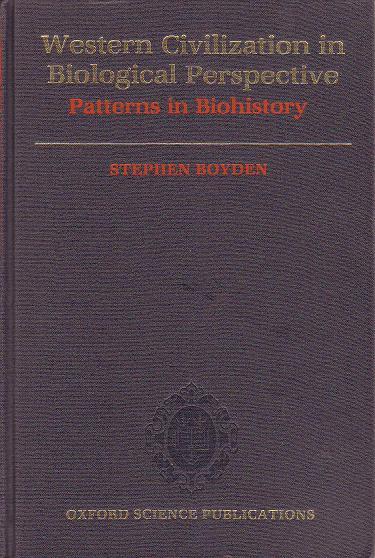Biohistory and Biopolitics
25 February 2012
Saturday
About a week ago I was browsing in a used book store and had the good fortune to come across a book that I’d never heard of, but just the title told me that it was something that would immediately appeal to my particular perspective on history. The book, which I purchased, is Western Civilization in Biological Perspective: Patterns in Biohistory by Stephen Boyden.
The author, I learned upon investigation, has had a long and varied career — exactly the sort of thing that would give a person the kind of broad perspective that would be needed to write the history from western civilization from a biological perspective.
Recently, in a series of posts — Geopolitics and Biopolitics, Addendum on Geopolitics and Biopolitics, and A Further Note on Geopolitics and Biopolitics — I took the idea of “biopolitics” and “biopower” from Foucault and developed it as a possible alternative to geopolitics as a form of strategic analysis.
There is nothing of Foucault in Boyden’s book. Foucault’s name does not appear in the index, and a search of the text reveals no reference to Foucault. More importantly, the nature of the text itself is utterly divorced from Foucault and from continental philosophy generally speaking — it seems to employ no terminology or concepts in common with the continental tradition, and treats of none of the familiar preoccupations of this tradition (Marx and Freud are mentioned in passing in a couple of places, but are in no sense a focus of the text; they do not even influence the terms of the discussion).
Although Boyden’s treatment of biohistory has virtually nothing to do with Foucault, I can’t imagine a more perfect theoretical foundation for biopolitics than a scholarly treatment of biohistory as found in Boyden. Boyden brings the kind of Anglo-American objectivity (though he is an Aussie) to biohistory that could greatly sharpen and improve the formulations of biopolitics, which latter are vulnerable to the enthusiasms of continental philosophy. Foucault himself insisted upon the “grayness” of genealogy, and the patient analysis of Boyden constitutes a de facto genealogy of biopower, which is something Foucault said that he had to write, but which he did not get to before he died.
A biohistory of civilization would be, in effect, an ecology of civilization, and Boyden employs ecological concepts throughout his study. One way to bring further analytical clarity to an ecology of civilization would be the systematic use of ecological temporality in the exposition of biohistory. This is something that I will think about.
. . . . .
. . . . .
. . . . .





